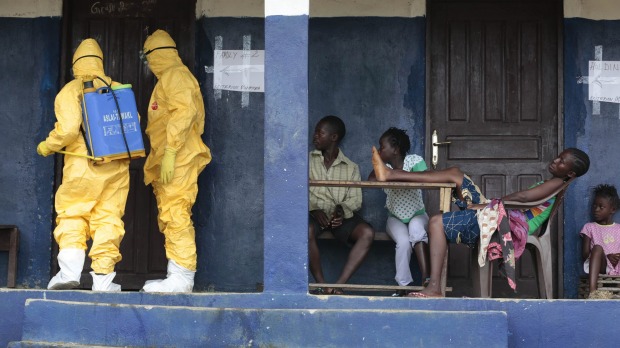
Residents of the village of Freeman Reserve, north of the Liberian capital Monrovia, watch ambulance officers disinfect a room where people with Ebola had been staying. Photo: Jerome Delay
Monrovia: Liberia called on Ebola survivors on Sunday to strictly observe a period of sexual abstinence after recovering from the disease amid fears the country’s latest case may have resulted from sexual transmission.
The West African nation suffered a setback in its efforts to end a year-long outbreak of the disease earlier this month when it recorded its first new case of Ebola in several weeks.
The patient, a 44-year-old woman, died on Friday. More than 10,300 people have succumbed to the disease across Liberia, Guinea and Sierra Leone, the three countries hardest hit by the worst Ebola epidemic on record.

A woman takes part in an Ebola virus vaccine trial at the Redemption hospital in Monrovia, Liberia. Photo: Abbas Dulleh
Deputy Health Minister Tolbert Nyenswah, who heads Liberia’s Ebola response, said health officials were monitoring 211 people known to have come in contact with the woman but none had so far presented with symptoms of the disease.
“New information indicates that sexual transmission may have occurred, but remains unproven,” he said.
“Additional tests are being undertaken to investigate this possibility.”

A usually busy street in Freetown is deserted as Sierra Leone enters a three-day countrywide lockdown on the movement of people on Friday. Photo: Michael Duff
Research has shown traces of Ebola in semen of some survivors for at least 82 days after the onset of symptoms.
There is no conclusive scientific proof these traces are infectious, but anecdotal evidence of several cases in West Africa and confirmed transmission of Marburg, another viral haemorrhagic fever, have led experts to warn of the potential risk of sexually transmitted Ebola.
As a precaution, the World Health Organisation (WHO) advises Ebola survivors to abstain from sex during a 90-day period following recovery or, failing that, to practice safe sex.
Mr Nyenswah reiterated the WHO’s advice and suggested survivors go a step further until the modes of transmission are better understood.
“Ebola survivors should consider correct and consistent use of condoms for all sexual acts beyond three months until more information is available,” he said.
Liberia has largely succeeded in getting its Ebola outbreak under control and was on its way to completing the 42 days without a new case necessary to declaring the country free of the disease when it recorded the most recent infection.
Its neighbours, however, have faced more difficulties in containing their own outbreaks.
Guinea’s President Alpha Conde announced on Saturday new emergency measures enabling authorities to restrict movements in western Guinea, where Ebola transmission continues a year after the epidemic was declared.
Sierra Leone, the worst affected country, launched a three-day national lockdown on Friday aimed at accelerating the end of its Ebola epidemic.
